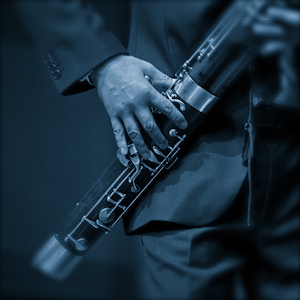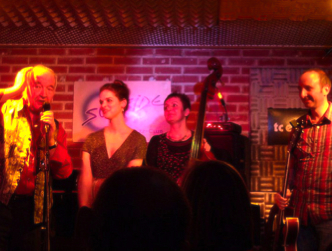Blues for Bassoon

- SUBSCRIBE
- ALREADY SUBSCRIBED?
BECOME A BONJOUR PARIS MEMBER
Gain full access to our collection of over 5,000 articles and bring the City of Light into your life. Just 60 USD per year.
Find out why you should become a member here.
Sign in
Fill in your credentials below.
 There’s no hat on the ground or a box or basket for collecting tips. As he plays, he is not watching the passersby, hoping to catch an eye or, better, an ear and earn a few pinched coins, dropped in with a sympathetic or knowing smile. His eyes are closed, or nearly so, and you’d think he could be anywhere—here will do—but where he really is, his here, is beyond me. And anyway, there’s hardly anyone around this evening, just me, the solo audience for his bassoon solo.
There’s no hat on the ground or a box or basket for collecting tips. As he plays, he is not watching the passersby, hoping to catch an eye or, better, an ear and earn a few pinched coins, dropped in with a sympathetic or knowing smile. His eyes are closed, or nearly so, and you’d think he could be anywhere—here will do—but where he really is, his here, is beyond me. And anyway, there’s hardly anyone around this evening, just me, the solo audience for his bassoon solo.
Imagine that. A man playing a bassoon all by himself in the dark on an unbusy street in Paris. Who does that? Who solos, with no strings or other reeds or horns to keep him company, on the bassoon? You hear the violin in the street and the accordion—too often, but I think la Mairie subsidizes the musicians—you hear the saxophone and the guitar, maybe a jugband with a washboard, but never the bassoon. And not this kind of music.
I think I’ve recognized what he is playing, which is just as strange as the musician and his instrument. It’s the trumpet part from a piece by Shostakovich when he was having one of his Soviet flirtations with American jazz, but this is not the concert score. The musician has taken the piece, rekeyed it, I think, for his bassoon, and is playing riffs, chord variations, letting the music wander, then giving it a wink and inviting it come back to where it began when Shostakovich scrawled it down on staff paper with his fountain pen more than eighty years ago.
The melody sounds like something from an early Fellini movie, waltz time, but sad and drooping at the end of phrases, and he has brought the tempo of the original way down, lingering like a miser over each note, pained at letting them go, taking their loss as slowly as possible, trying to grab them back out of the evening air. He plays as if the music knows him and his vast sadness, the music coming out of his instrument as broke and lonesome as a tenor sax under the El on a cold night in November.
It must be fifteen minutes now, maybe more, that he’s been playing and inventing, improvising for the night air, the empty street, and maybe me, and I am sure enough that this part of the original piece that he’s playing is no more than a few minutes, maybe only three, lovely, but smart enough to know when to go away and leave a memory rather than an earful and a belching bellyache. His playing is nothing like that, still squeezing out the pulp and zest of the music, not a few diluted drops. And he goes on, playing for another five minutes—could be, not less, I don’t think—knowing where he is going, never lost or at a loss for the next note or chord, sure of his music, sure of something I can’t hear or understand except that it all seems right, nor do I think he needs to wind up, get on to something else. He keeps playing, confident, oblivious.
And then he comes to a stop, just ends: no coda or counterpoint, not even the punctuation of a little double note, the ending’s bounce, the finale’s signal. He comes to the end of a phrase, maybe he holds the last note an extra beat, and lets his breath fade through the instrument, and then there is nothing. Done. He doesn’t move or open up his eyes and look around. He drops the bassoon down in front of his chest, breathing lightly, not moving, not making a move to go on his way, not waiting for the audience to do anything, just standing in his place, his here, quiet.
What now? It doesn’t make sense to applaud. He’s not playing for me, doesn’t even know I’m here. He’s not playing for an audience, even of one, or for himself, I guess, but for the music, because he wants to play it or needs to play it, to blow out his cold blue notes in waltz time on a warm evening in Paris, in spring, in the middle of nowhere. Could I say something? What could I say? He’s not in search of compliments any more than he’s in search of a tip, clapping hands, anything. He’s just playing—was playing—and now he’s simply there at rest. I wait a minute or two—it seems long, but it can’t be—and start to go, walking away to his left.
He starts to play again, from another familiar piece, Vivaldi this time, and the part he is playing, this time, was actually written for the bassoon, a show piece with the bassoon moving the other instruments upstage and out of the lights. Yet he is playing the whole piece, the parts for violins and clavier and oboe. These parts he plays at a languorous tempo, a little slower—it could be—than an ordinary performance. When he comes to the bassoon parts, he again brings it far down in tempo, inflating the loneliness of the music, even in the later passages where Vivaldi seems to have regained his normal chipper self.
But there is no improvisation, beyond the changes in tempo, no additions, just the music as he needs to play it at this moment, the music as it is and has been familiar. I’ve stopped, walked back to hear better, and look around for the first time since he began playing. There is a couple in the street now, a man and a woman, listening to the music, smiling. The man appears to know it, conducting, making little gestures with his right hand, bobbing his head left and right to the rhythm, blowing through his lips as if whistling along. The woman is talking into her cell phone. Animated, she is gesturing at the musician and then back at the phone, nods at whoever it is on the other end of the call, a definitive nod, a big movement of her head for an exclamation point, ends the call.
Is she calling the friends she just had dinner with? They will come, running, on the double, to hear Vivaldi being played by a terrific musician, playing the whole concerto by himself, one man playing molti istromenti, a one-man Baroque bassoon band. And they will call their friends, root and branch of the phone tree. Vivaldi, du vrai du vrai, right here and now, come. They will and they’ll love it, and when he is done with the piece, when he falls silent again with his eyes still barely open, they will applaud and shout bravo! I don’t want to be here when they do.
A Paris hotel we think jazz fans and shoppers will especially like is . . .
Hôtel de Buci, a 4-star hotel located in the heart of Saint Germain, Paris 6th. Hôtel de Buci has just 24 suites with antique furnishings, free WIFI, nonsmoking rooms, air conditioning, cable TV and everything you’d expect at a luxury hotel. Daily breakfast buffet and on-site bar. Within a few minutes by foot you’ll find chic boutiques, farmers’ markets, jazz clubs, cafés & bars, the Louvre, Luxembourg Gardens, Café Deux Magots and more. Metro: Odéon, St Michel and St Germain are very near. Take our advice and consider booking this or any hotel stay through our partner, Booking.com, part of Priceline.com–if you find the same room for less, Booking.com guarantees to match the price!
 Jazz fan interested knowing more about the current and historical jazz scene? Our partner, Context Travel, has a cool small-group “walking seminar” that explores the jazzy side of Paris. Jazz may be an American art form, but much of its history can be traced to Paris underground jazz clubs in the 1920s. Paris has had a vibrant jazz club scene for decades and jazz icons like Django Reinhardt, Miles Davis and Dizzy Gillespie remain legends in Paris.
Jazz fan interested knowing more about the current and historical jazz scene? Our partner, Context Travel, has a cool small-group “walking seminar” that explores the jazzy side of Paris. Jazz may be an American art form, but much of its history can be traced to Paris underground jazz clubs in the 1920s. Paris has had a vibrant jazz club scene for decades and jazz icons like Django Reinhardt, Miles Davis and Dizzy Gillespie remain legends in Paris.
Start your walk in St-Germain-des-Prés and hear about jazz history from your docent before a stop at a jazz club in the nearby Latin Quarter. After that, you’ll walk past several historically important jazz clubs on your way to rue des Lombards, where your walk ends with a headlining jazz act at one of Paris’s premier jazz clubs. Read more here: Le Jazz Hot, An American Art Form in Paris Walk in Paris
More in Bonjour Paris, essay, Joseph Lestrange, story



